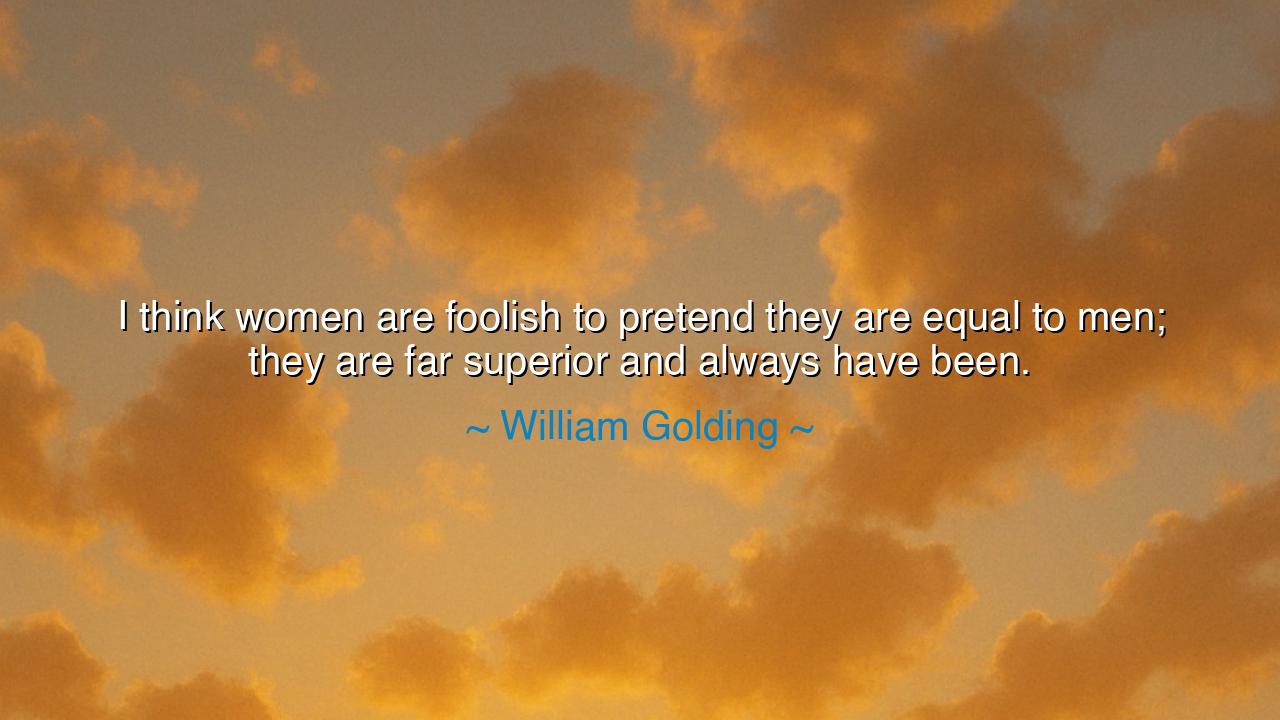
I think women are foolish to pretend they are equal to men; they
I think women are foolish to pretend they are equal to men; they are far superior and always have been.






"I think women are foolish to pretend they are equal to men; they are far superior and always have been." — these words by William Golding, an author known for his insightful and often controversial takes on human nature, offer a provocative and powerful reflection on the strength, wisdom, and influence of women. Golding’s assertion is not simply a claim of equality, but a celebration of the superiority of women in areas where virtue and wisdom shine brightest. He boldly elevates the feminine spirit, calling attention to its resilience, nurturing capacity, and innate wisdom—qualities that, in his view, set women above men. In a world where men have traditionally dominated the public and political spheres, Golding’s words serve as a challenge to long-held views about gender roles and an invitation to recognize the power that women have wielded throughout history, often silently, but never without great impact.
In the ancient world, the idea of gender roles was deeply embedded in the fabric of society, but even in such a context, women were often revered and respected in roles that required wisdom, compassion, and sacrifice. The Greeks may have celebrated the strength of men in battle, but they also recognized the wisdom of women like Socrates' mother, Phaenarete, who, in her own way, taught the importance of virtue and nurturing the soul. In Roman society, matrons held great power within the family and were revered for their ability to maintain balance and order in the most fundamental unit of society. Through these ancient examples, we see that even in times when gender roles were rigid, women played critical and irreplaceable roles in shaping both family life and the broader moral fabric of civilization.
Golding’s words are an acknowledgment of a hidden strength that has always existed in women, one that is often overlooked in a world obsessed with outward conquest and dominance. The ancient myths provide ample evidence of this strength. Consider Athena, the Greek goddess of wisdom and warfare, who embodied both the intellect of a strategist and the compassion of a healer. Hera, queen of the gods, held sway over the heavens, embodying both the power of a ruler and the nurturing spirit of motherhood. These divine women were far from mere symbols; they were the very archetypes of balance and wisdom, showing that true power lies not just in brute strength, but in the ability to nurture and guide those around us.
In history, we see countless examples of women who demonstrated superiority in realms often dominated by men. One such example is Queen Elizabeth I of England, who, in a time of great political turmoil, ruled with unmatched wisdom, grace, and foresight. Elizabeth was faced with the weighty responsibility of maintaining power in a patriarchal society, yet she navigated the complex political landscape with unparalleled skill. Her ability to inspire loyalty, her diplomatic acumen, and her deep understanding of the hearts and minds of her people made her reign one of the most successful in history. Elizabeth’s intellectual superiority, not just in diplomacy but in emotional intelligence, proved that women can lead with the same, if not greater, strength and wisdom as any man.
Golding’s words also call us to reflect on the countless unsung heroines throughout history—those women whose contributions were not celebrated in the public eye but who quietly shaped the world through their dedication and moral clarity. Think of Florence Nightingale, whose work in the Crimean War revolutionized nursing and laid the foundation for modern healthcare. Her insight into the need for proper hygiene and care was not driven by personal glory, but by an innate desire to serve humanity. Nightingale’s compassion and intellectual rigor were pivotal in changing the course of healthcare, a testament to the often-overlooked power of women.
The lesson we take from Golding’s words is one of acknowledgment—of recognizing and embracing the superiority of women in areas where wisdom, empathy, and moral clarity shine. While the world may often place value on dominance and force, true leadership is not defined by physical prowess or political power but by the ability to inspire, nurture, and guide others with wisdom. Golding challenges us to acknowledge the quiet strength of women, to appreciate the depth of their contributions, and to understand that superiority is not always loud and forceful—it can often be found in the quiet, enduring power of the heart.
In our own lives, let us strive to honor the women who have shaped us and the world around us, to recognize their wisdom, and to learn from their strength. Whether it’s a mother, a teacher, a leader, or a friend, let us not be so quick to dismiss the power of those who lead with empathy, intelligence, and compassion. Let us also strive to embody these same virtues in our own lives, understanding that the heart of true greatness does not lie in domination but in the quiet, powerful wisdom that nourishes the world. Just as Golding highlights the superiority of women, so too should we strive to live with a balance of both strength and grace, recognizing the gifts that each individual—regardless of gender—brings to the world.






AAdministratorAdministrator
Welcome, honored guests. Please leave a comment, we will respond soon